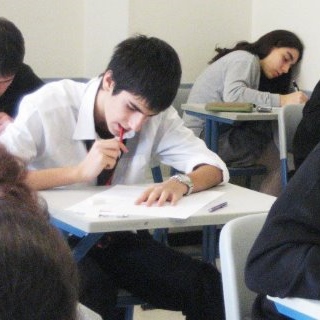News
Back to school – ‘the right decision’
There are no easy answers for parents afraid to send their children back to school in June, a panel of experts told a webinar hosted by Yeshiva College on 20 May, but the implications of remaining in lockdown are worse for their children than getting back to “normal” life.

JULIE LEIBOWITZ
“We’ve got to get our children back into a routine,” said Dr Anton Myburgh, a specialist physician and pulmonologist at Linksfield Clinic in Johannesburg. “They are going to start suffering from psychological illnesses, become depressed and withdrawn.”
Myburgh compared our situation to the biblical predicament of Noah, who having led the Jewish people out of the clutches of the Egyptians, faced drowning in the sea.
“As we stand on the edge of our ocean, it might seem attractive to stay where we are, but we need to be honest, standing still isn’t viable. The best we can do is to try and understand the nature of what lies ahead so we can navigate it – how deep, how dangerous, and how to protect ourselves.
“Parents must understand that if they are anxious, it will affect their children. Rather boost their immunity and change their routine, for example, by making sure that they wash and change their clothes at the end of the school day.”
Myburgh and Barry Schoub, professor emeritus of virology at the University of the Witwatersrand and an advisor to Jewish communal institutions, stressed that there is growing evidence in a number of studies across the world that classroom transmission doesn’t play a major role in transmission of the virus.
This is because children appear to be more mildly infected by COVID-19 or are asymptomatic, and they transmit the virus to a lower extent than adults. Experts aren’t absolutely sure why, but suggest reasons as varied as the level of children’s immune systems to the fact that their receptor sites for COVID-19 infection are more immature than adults.
Studies also show that children are less exposed to COVID-19 in a structured, safe, contact-school day than they are outside of the classroom, said Myburgh and Schoub, when they might be exposed to mingling with people in an unsafe way.
“Lockdown is based on the influenza model in which children were high transmitters of the disease,” Myburgh said, with a greater than 50% rate of infection. “We’re not seeing this with COVID-19,” he said, which is a “brand-new” virus, unlike Spanish flu, which was around long before the pandemic of 1918.
“In the Italian city of Vo, more than 80% of the population was tested, and only 2.8% were found to be positive, with no children under the age of 10 found to be infected. Studies in Spain, Wuhan, and Japan also show a minimal amount of children infected, and studies in Taiwan have shown relatively low transmission. In France, only 70 children out of 1.4 million school-going children were found to be infected.
“Schools are putting in place the right prevention parameters around the world,” Myburgh said, including protective gear, distancing, and sanitation measures. “The problem will be outside the classroom, with parents cohorting. We should worry more about the parents.”
“Children need a social construct for learning,” said Gayle Harris, a specialist in education leadership, early childhood development, and head of St Stithians Junior Preparatory in Johannesburg. “[The junior phase] is a critical stage for social and emotional development as well as literacy, numeracy, gross and fine motor skills.”
Her views were echoed by Rebbetzin Natalie Altman, kodesh and ethos director at Yeshiva College, who talked about the “scourge of isolation” brought by social media, exacerbated in lockdown conditions. “During lockdown, any child with a smartphone is experiencing life – social, emotional, intellectual – through one space, and it’s 24/7. It’s difficult to untangle. It’s critical to allow for differentiation and rest,” she said.
Harris pointed out that younger children are totally dependent on adults for their care, so school is an essential social service for the economy. Also, their ability to learn online is limited by their concentration span and ethics around screen time.
She mentioned the issue of malnutrition, with many South African children dependent on school feeding schemes, and she pointed out that children with barriers to learning need the help of remedial therapy or psychologists, which might be available only at school.
“Stringent hygiene measures require detailed planning,” Harris said. “It may mean that at some schools, children have to attend on alternate days, at staggered times, or in different venues. Playgrounds have to be rethought. We need to find creative ways to meet physical needs.
On the subject of early learning centres like nursery schools, Harris said that according to the South African Schools Act, Grade R and below weren’t compulsory education years, and this sector would need “special consideration for school return”.
Panellists also cautioned that it might not be advisable for children in families with co-morbidities or cohabiting elderly parents to go back to school, and Yeshiva College Education Director Rob Long, said it was already investigating individual family circumstances. Harris said that ultimately, many schools may continue to offer a mix of online and onsite learning indefinitely.
“Our representation to the education department is that if independent schools meet all conditions of prevention, they should be allowed to open,” said Lebogang Motjane, the executive director of the Independent Schools Association in Southern Africa. “We are hoping for codification on the preconditions for opening and standard operating procedures.”
“There are serious consequences for the community in continuing the lockdown apart from [the notion of] ‘don’t work, don’t eat’,” said Rabbi Akiva Tatz, the director of the Jerusalem Medical Ethics Forum, saying that the Talmud places a high value on communal welfare.
“We are dealing with tension between a life-saving issue: lockdown, and a different life-saving issue: education and the broader opening up of society,” he said. “The cutting edge is children returning to school.”